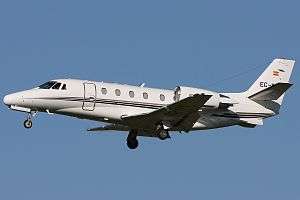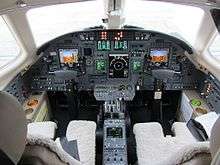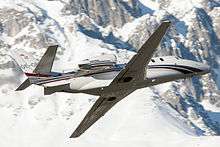Cessna Citation Excel
| Citation Excel Citation XLS / Citation XLS+ | |
|---|---|
 | |
| Cessna 560XL Citation Excel in landing configuration | |
| Role | Business jet |
| Manufacturer | Cessna |
| First flight | 29 February 1996 |
| Status | Active In production |
| Produced | 1996-present |
| Number built | 575 |
| Unit cost |
US$12.75 million (2015)[1] |
The Cessna Citation Excel (Model 560XL) is a turbofan-powered, medium-sized business jet built by the Cessna Aircraft Company in Wichita, Kansas, United States. A member of the wide-ranging Citation brand of business jets, the Excel was evolved into the Citation XLS and then the Citation XLS+ models.
Design and development

With the success of Cessna's high-end Citation VII, the manufacturer saw a market for an aircraft with the Citation X's features but aimed at a more traditional market, where it would chiefly compete with twin-turboprop aircraft. Rather than being a direct variant of another Citation airframe, the Excel was a combination of technologies and designs. To produce the Excel, Cessna took the X's wide, stand-up cabin fuselage, shortened it to about 21 feet (6.4 m) and mated it with an unswept wing utilizing a supercritical airfoil (based on the Citation V Ultra's wing) and the tail from the Citation V.
To power the aircraft, Cessna chose the Pratt & Whitney Canada PW500 turbofan. The Excel has the roomiest cabin in its class of light corporate jets and can seat up to 10 passengers (in high-density configuration; typically the number is six to eight in a corporate configuration), while being flown by a crew of two.[2]
The project was announced at the annual NBAA convention in October, 1994, and the prototype aircraft took off on its first flight on February 29, 1996. By the time FAA certification was granted in April 1998, Cessna had over 200 orders for the aircraft. By the time the 100th Excel was delivered in August 2000, the Wichita production line was producing an aircraft every three days.[2] By the time the aircraft was superseded by the Citation XLS, a total of 308 had been built.[3] The Excel has had an exceptional safety record, with only 6 accidents on record.[4]

The Citation Excel was the original version of the Citation Excel series of aircraft. There were two cockpit configurations of the original model involving where the landing gear was on the panel. With the gear on the left hand side, the MFD was moved to the right slightly and both radios were moved to the right of the MFD next to each other. With the gear handle on the right side, the MFD remained centered with the radios on either side. The Excel uses Honeywell avionics and an optional Auxiliary power unit also powered by Honeywell.
The Citation XLS was the first "makeover" that the Excel received. Besides a glass cockpit based on the Honeywell Primus 1000 EFIS avionics suite, the XLS featured the upgraded PW545B engines with increased performance.[5]
The Citation XLS+, or simply "Plus" configuration was the upgraded version of the aircraft, with the inclusion of FADEC engine controls, improved PW545C engines, and a completely revised nose design similar to that found on the Citation Sovereign and Citation X. The Citation XLS+ features Collins Pro Line 21 Avionics and a four screen LCD EFIS display as opposed to the three tube (CRT) Honeywell display in the XL and the three screen LCD Primus 1000 in the XLS.[6]
Operators
The aircraft is operated by private individuals, companies, fractionals, charter operators and aircraft management companies. The Swiss Air Force is an operator.
NetJets is also a major operator in the United States offering fractional ownership and charter flights.
Accidents and incidents
- On 13 August 2014, a Citation 560XLS+ transporting Brazilian presidential candidate Eduardo Campos and his entourage in the lead up to elections due in October crashed in the city of Santos, São Paulo, killing all 7 on board.[7] This was the first fatal crash of a Citation Excel since entering service in 1996.[8] See 2014 Santos Cessna Citation accident.
Specifications (Citation XLS+)
Data from Cessna Citation XLS+ web site [6]
General characteristics
- Crew: 2
- Capacity: 9 passengers max
- Length: 52 ft 6 in (16.0 m)
- Wingspan: 56 ft 4 in (17.17 m)
- Height: 17 ft 2 in (5.23 m)
- Empty weight: 12,800 lb (5,086 kg)
- Useful load: 7,400 lb (4,077 kg)
- Max. takeoff weight: 20,200 lb (9,163 kg)
- Powerplant: 2 × Pratt & Whitney Canada PW545C turbofans, 4,119 lb (18.32 kN) each
Performance
- Cruise speed: 441 ktas
- (507 mph (816 km/h))
- Range: 3,441 km (2,138 mi)
- (1,858 nautical miles)
- Service ceiling: 45,000 ft (13,716 m)
- Rate of climb: 3,500 ft/min
- (17.78 m/s (58.3 ft/s))
See also
- Related development
- Aircraft of comparable role, configuration and era
References
- ↑ "Business Jets Specification and Performance Data" (PDF). Business & Commercial Aviation. Aviation Week. May 2015.
- 1 2 The Cessna 560XL Citation Excel from Airlines.net
- ↑ Citation Excel info from Aviation Safety Network
- ↑ NTSB accident database query
- ↑ Cessna Citation XLS web site Archived February 23, 2007, at the Wayback Machine.
- 1 2 Cessna Citation XLS+ web site Archived February 27, 2009, at the Wayback Machine.
- ↑ Gustavo Bonato (13 August 2014). "Brazil presidential candidate Campos killed in plane crash". Reuters.
- ↑ "Crash of a Cessna 560XLS+ Citation Excel in Santos: 7 killed". Bureau of Aircraft Accidents Archives. 13 August 2014.
External links
| Wikimedia Commons has media related to Cessna Citation Excel. |
- Cessna Citation family home page
- Cessna's Excel performance and specifications page archived at archive.org